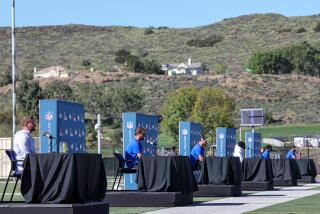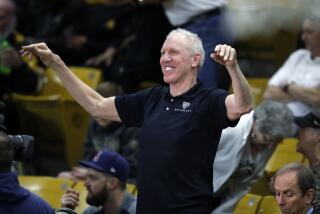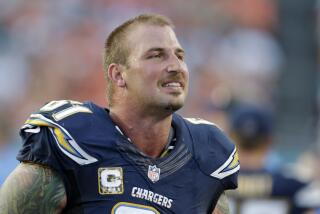A Season to Remember : John Hadl Helped Rams Begin First Knox Era in 1973
The telephone keeps ringing, the demand for basketball tickets to view Kansas in the NCAA tournament is overwhelming, and oh-for-the-good-old-days when all John Hadl had to do was sidestep the likes of Mean Joe Greene and Ted Hendricks.
“Terrible, just terrible,” said Hadl, who supervises all fund-raising activities for the Kansas athletic department. “We’ve come to Chicago for the tournament, and each team gets 250 tickets, and we’ve got 5,000 requests.
“The basketball team gets some, the chancellor gets what he wants, and then there’s the administration. That leaves me with about 85 tickets.”
Who better, however, to pass on tickets and get them into the right hands than the former quarterback who so often was on target for the Chargers and Rams?
“Unbelievable,” Hadl said. “We’re coming up on 20 years since I first joined the Rams. What a great time I had.”
What a grand time for the Rams.
After going 6-7-1 a year earlier, they were 12-2 in regular-season play under new Coach Chuck Knox in 1973 after trading Coy Bacon and Bobby Thomas to the Chargers for Hadl, who was 33.
Hadl, after replacing Roman Gabriel, completed 135 of 258 passes for 2,008 yards with 22 touchdowns and was named the NFC’s player of the year. He threw four touchdown passes to Harold Jackson in a 37-31 victory over Dallas and started for the NFC in the Pro Bowl.
“I was ready to leave San Diego, and coming to Los Angeles was just great,” Hadl said. “Chuck was in his first year, and he was just one of the boys. He was young then . . .
“He was an excellent football coach, strong on fundamentals, and he surrounded himself with great coaches. The owner, Carroll Rosenbloom, wanted to win so badly, and he was first class all the way. You had that owner, that coach and that combination was bound to produce success.
“It hasn’t happened recently, but let me tell you, if you win in L.A., it’s a good deal.”
The Rams lost their playoff opener in 1973 to Dallas, 27-16, and then struggled to a 3-2 start in 1974.
“All of a sudden I’m in Green Bay,” Hadl recalled. “I’m traded. I was really mad about it initially. I liked Knox, we had won the division, we had a good team, and I didn’t know what the hell the Rams wanted.
“I was pretty reluctant to go to Green Bay and almost went back to San Diego. But that’s when the money went up, and they tripled my salary. Hey, it was just another experience in life. But it was awful cold. Every day.”
The Rams received five draft picks from the Packers, including two in the first round, and handed the football to James Harris. They went on to win another division title, while Hadl completed a 16-season NFL career with two-year stops in Green Bay and Houston.
“I keep my eye on the Chargers and Rams,” Hadl said. “The Rams haven’t been doing so good; they need to get some players.”
Amen.
“Tough business,” Hadl said, and he understands. He was both player and coach in the NFL, and a head coach in the United States Football League. He wanted it all to last forever, and yet as talented as he was, the game refused to oblige.
“I love this game,” Hadl said in a 1974 magazine article. “They’ll have to cut this uniform off me first.”
The scissors, please.
After returning to the Rams as an assistant coach in 1982, he lost his job along with Coach Ray Malavasi.
He became quarterback coach for Denver and was assigned the task of breaking in John Elway, but he remained with the Broncos for only one year.
“Look at the way things have gone for Elway; if I had stayed with him, I might still be coaching,” he said. “You can look pretty good hanging around with a guy like that.”
Hadl became head coach of the Los Angeles Express in the USFL, and with Steve Young’s help at quarterback, he guided his team to a division title.
“Lost to George Allen and Phoenix in the playoffs,” Hadl said. “And the next year the league went belly up.”
He began looking for work. He joined a friend in Texas and bought and sold real estate, “until everything went to hell with the economy down there,” he said.
Coach Glen Mason hired him as receivers coach at Kansas, and he was back in football, but after two years, he received a higher calling. The school administration, eager to take advantage of his reputation as one of Kansas’ all-time athletes, created an assistant athletic director post for him.
Hadl became the athletic department’s development director, and if there was a luncheon gathering of businessmen, he was on call.
“We just raised $7 million for a sports complex from individual contributors across America, and the loyalty to KU showed itself just fine,” Hadl said. “It took about 18 months to get that done.
“We also raised $3.1 million for our scholarship fund for our 410 athletes. It’s a different world from the one I have been used to, but I can stay in touch with athletics, and yet when it comes to those eight-hour administrative meetings, I can go play golf.”
Hadl was a two-time All-American (1960-1961) at Kansas after a crowd-pleasing career at local Lawrence High School.
He began his career at Kansas as a halfback and at one time led the nation as a punter. He switched to quarterback his junior season and went on to become the only player selected as MVP of both the East-West Shrine Game and the College All-Star Game.
His No. 21 is one of just three jerseys to be retired by the school.
“People remember pretty good back here,” Hadl said.
Folks in Kansas are also mighty proud of their basketball team, and to watch the team play, they must first make contact with the fund-raiser who used to play football.
“We can win this whole thing if the kids get on fire and start hitting shots,” Hadl said. “You want to win because it helps the whole school, and it helps the fund-raising stuff a lot.
“And you want to win,” the former athlete said with conviction, “because isn’t that what it’s all about?”
More to Read
Go beyond the scoreboard
Get the latest on L.A.'s teams in the daily Sports Report newsletter.
You may occasionally receive promotional content from the Los Angeles Times.










